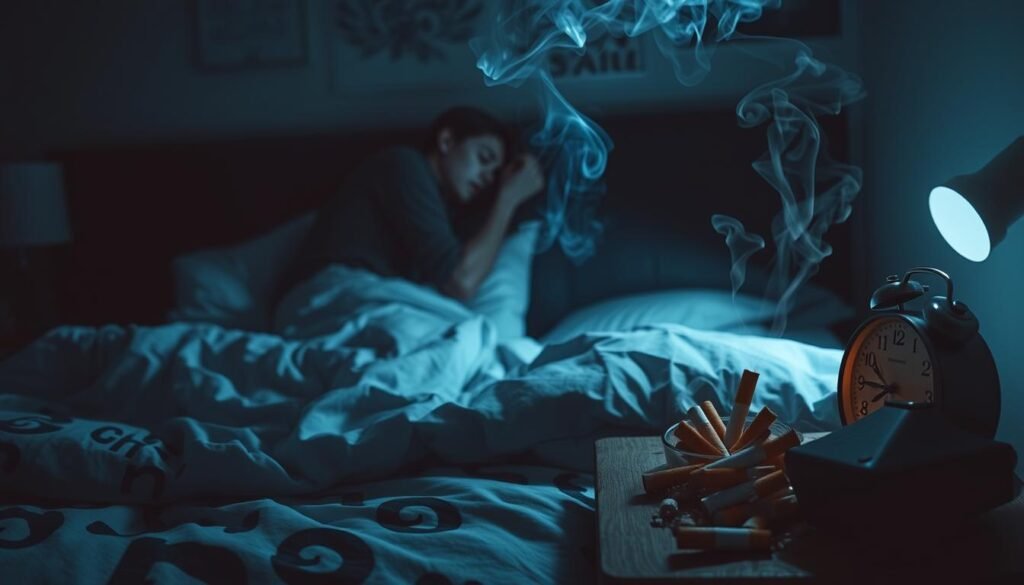About 80% of smokers find it harder to fall asleep than nonsmokers, taking 5 to 25 minutes more. This shows how nicotine can mess with how well and long we sleep. Smoking is tied to big health issues like heart disease and cancer. It’s key to see how it affects sleep because bad sleep makes quitting harder.
Nicotine keeps you in lighter sleep, so you wake up more and have trouble sleeping. Smokers often feel very tired during the day. It’s important to know how smoking affects sleep if you want to be healthier. To learn more, check out Sleep Foundation and Biotin Bloom.
Key Takeaways
- 80% of smokers experience sleep disturbances compared to nonsmokers.
- Nicotine increases the time it takes to fall asleep, affecting overall sleep quality.
- Smoking is linked to increased tiredness and disrupted sleep patterns.
- Sleep disturbances may complicate quitting smoking but usually improve over time.
- Strategies such as exercise and avoiding caffeine before bedtime can help mitigate sleep issues.
The Connection Between Nicotine and Sleep
Nicotine affects sleep in many ways. Studies show that smokers are almost 50% more likely to have sleep problems than non-smokers. Nicotine can make it harder to fall asleep and reduce sleep quality.
Nicotine is a stimulant, which means it increases heart rate and can change mood. This leads to trouble sleeping. It also raises the chances of getting sleep disorders like sleep apnea. Quitting smoking can make sleeping difficult too. Almost half of the people who stop smoking face sleep issues.
When you stop using nicotine, withdrawal symptoms can start in a few hours. They usually get worse in the first days. This can cause more sleeplessness and anxiety. Studies also link vaping nicotine to sleep issues, like being restless at night. This is especially true for young people between 12 and 17.
To lessen nicotine’s effect on sleep, experts suggest regular sleep habits. Avoid caffeine and alcohol before bed. Create a calming routine before sleep, and stick to a sleep schedule. These steps can help improve sleep quality for those trying to quit nicotine.
| Factor | Smoking | Vaping | Non-Smokers |
|---|---|---|---|
| Likelihood of Sleep Disturbances | Higher (50% more) | Increased restlessness | Lower |
| Risk of Sleep Disorders | Increased risk of sleep apnea | Restless nights, bad dreams | Lower |
| Experience of Sleep Issues after Quitting | About 50% of former smokers | Common among young users | N/A |
Nicotine’s Stimulant Effects on the Central Nervous System
Nicotine acts as a powerful stimulant on the central nervous system. When consumed, it quickly boosts alertness and wakefulness. This leads to a short-term sense of well-being. However, this can disrupt the body’s need for sleep, causing dependence.
The stimulant properties of nicotine are key to addiction. It raises heart rates and triggers a release of endorphins. This makes the intake of nicotine enjoyable for many. When dopamine levels rise, it leads to feelings of happiness and reward. But, long-term use changes brain chemistry and function, making quitting hard due to withdrawal symptoms.
Ongoing studies examine the many effects of nicotine, including its safety and long-term health risks. For those facing addiction, options like nicotine replacement therapies help. Medications such as bupropion and varenicline also aid in recovery. Understanding the effects of nicotine on the central nervous system is crucial for effective treatment.
How Nicotine and Smoking Disrupt Sleep Cycles
Nicotine and smoking harm sleep cycles, leading to problems with sleep. Smokers may need up to 25 minutes more to fall asleep than those who don’t smoke. This delay messes with the natural sleep-wake cycle. It increases sleep-related anxiety and frustration.
Smokers also spend more time awake in bed. This means they get less sleep overall. They also experience less deep sleep compared to non-smokers. The sleep cycle disruption due to nicotine changes how quickly you fall asleep. It also affects the quality of sleep significantly.
Those who start smoking young are more likely to report insomnia. Non-smokers can have poor sleep because of second-hand smoke. E-cigarette users face similar issues, showing that nicotine affects sleep no matter how it’s used.
Long-term smoking is linked to broken sleep patterns. It also raises the chances of snoring and sleep apnea. These issues can cause daily fatigue. It becomes hard to keep up with day-to-day tasks. Understanding the smoking impact on sleep quality shows why it’s important to quit smoking.
To better sleep during nicotine withdrawal, some treatments help. Cognitive-behavioral therapy for insomnia (CBTi) and light exercise are effective. Nicotine replacements might work differently for everyone. Heavy smokers often have worse withdrawal symptoms at night. This can impact sleep quality. Recognizing how smoking and nicotine affect sleep is crucial for improving sleep health.
Impact of Smoking on Sleep Quality
Smoking badly affects how well you sleep. Many studies have found that smoking messes with sleep. People who smoke usually don’t sleep as long. They often wake up a lot at night. This shows the tricky ways in which smoking messes with being well-rested.
People in studies have said they don’t sleep well. They use something called the Pittsburg Sleep Quality Index (PSQI) to measure this. If someone’s score is over 5, it means they have big sleep problems. This bad sleep is linked to several issues. One big problem is withdrawal symptoms. They make it really hard for smokers to stop because it disturbs their sleep.
Also, craving cigarettes makes sleeping hard. If you really want a cigarette, your sleep won’t be as refreshing. This leads to feeling tired in the day. It becomes a vicious cycle: bad sleep makes you want to smoke more, and that makes your sleep even worse.
The table below shows important information from recent research:
| Factor | Association with Sleep Quality | Coefficient | p-Value |
|---|---|---|---|
| Withdrawal Symptoms | Increased sleep disruptions | 1.63 | 0.0043 |
| Craving | Poorer sleep quality | 0.51 | 0.2471 |
| Total Smoking Urges | Degraded sleep quality | 1.10 | 0.0118 |
| Daily Exercise | Improved sleep quality | -0.82 | 0.0379 |
The data shows that smoking is bad for your health in more ways than just one. Being addicted to nicotine and smoking a lot can cause ongoing sleep problems. This could lead to bigger health issues like getting fat, feeling very sad (depression), and heart disease. So, people who smoke are fighting two battles: beating addiction and trying to sleep better at night.
Sleep Disturbances Caused by Nicotine
Individuals who use nicotine might have sleep issues that hurt their health. Smokers have sleep troubles 50% more than non-smokers. Nicotine makes it harder to fall asleep and causes waking up often during the night.
Nicotine affects sleep by increasing light sleep stages. This causes more night awakenings. It reduces the deep sleep needed for rest and recovery.
Nicotine can make you snore and lead to sleep problems like sleep apnea. This makes you tired and disrupts your day. Quitting nicotine brings withdrawal symptoms like anxiety, making sleep issues worse.
Quitting nicotine starts a challenging cycle. Withdrawal can cause vivid dreams that interrupt sleep. About half of the people stopping nicotine report poor sleep.
To sleep better, those quitting should practice good sleep habits. Exercising helps with cravings and sleeping. Limit caffeine before bed to improve sleep.
| Type of Disturbance | Description | Potential Solutions |
|---|---|---|
| Difficulty Falling Asleep | Longer time to initiate sleep | Practice good sleep hygiene, reduce caffeine |
| Frequent Nighttime Awakenings | Waking up multiple times during the night | Maintain a consistent sleep schedule |
| Poor Sleep Quality | Less time in deep sleep stages | Use relaxation techniques before bed |
| Sleep Apnea | Risk of obstructive sleep apnea increases | Consult a doctor for evaluation |
| Vivid Dreams | Intense and often disruptive dreams | Consider reducing dosage of nicotine replacement therapy |
Cigarettes and Sleep Disruption: A Deeper Look
Cigarettes harm sleep quality. Studies show up to 24% of smokers get worse sleep than non-smokers. They have lighter and more disrupted rest. This shows a strong link between smoking and sleep problems, leading to bad sleep patterns.
Smokers usually have more light sleep and less deep sleep. About 22.5% of smokers don’t feel rested, unlike only 5% of non-smokers. Smokers struggle more in the early sleep stages. They have less deep sleep and more light sleep.

Quitting smoking can cause up to 42% of people to have insomnia. Nicotine withdrawal makes sleep issues worse. Yet, using nicotine replacement therapies like patches and gums can help. Also, calming evening activities or gentle music can improve sleep after quitting.
Smokers are four times more likely to feel tired after sleeping. The link between smoking and sleep issues is complex. Improving sleep quality and quitting smoking can greatly help public health. It’s important to understand how they are connected to promote healthier living.
Understanding Sleep Cycle Disruption Due to Nicotine
Nicotine affects our sleep in complex ways. It acts on specific receptors in the brain, changing the release of neurotransmitters. This not only keeps us awake but also messes with how we sleep.
Most of our sleep is non-rapid eye movement (NREM) sleep. But nicotine use can increase the time spent in light sleep, known as N1 sleep. This leads to poorer quality rest. Smokers find themselves in deeper N2 sleep for longer, but miss out on the deepest, most restful N3 sleep.
A study in 2019 showed drinking alcohol and using nicotine before bed worsens sleep quality. It causes sleep to be broken up and less refreshing. This is important because poor sleep is linked to many health problems, including chronic disease and mental decline.
The battle against nicotine addiction is revealing worrying figures. Tobacco use is decreasing overall, but remains high among those with lower income. Mental health issues add another layer to this challenge, as those affected are more likely to smoke.
In conclusion, nicotine’s impact on sleep is a big concern for our health. Understanding this can help us find better ways to tackle tobacco addiction and improve sleep.
Smoking Habits and Sleep Disturbances
Looking into how smoking and sleep troubles are related offers key insights. Smokers often face sleep issues, especially if they smoke right before bed. Nicotine plays a big role in messing with sleep quality.
Studies with over 3,400 people show that smokers struggle more with sleep. They take longer to fall asleep, wake up often, and don’t sleep as well. Smokers face more sleep problems than those who never smoked. This highlights *the impact of smoking on sleep quality*.
But there’s more to it than just smoking. Being male, overweight, and having health issues like diabetes add to sleep problems. Both men and women smokers are more likely to have obstructive sleep apnea (OSA). It’s clear that smoking is closely linked to sleep troubles.
Smoking affects sleep in many ways. Smokers take longer to fall asleep and their sleep quality drops. But changing lifestyles, like managing stress better and stopping smoking, helps improve sleep.
| Group | Participants | Sleep Disturbances | Odds Ratio for OSA |
|---|---|---|---|
| Never Smokers | 1498 | Lower incidence | 1.00 |
| Former Smokers | 1480 | Moderate incidence | 1.53 |
| Current Smokers | 1369 | Higher incidence | 1.79 |

Understanding when and why you smoke is key to tackling its effects. Cutting down on smoking and being mindful can greatly improve your sleep and health. You can find more on this topic in this insightful study.
Nicotine Withdrawal and Sleep Patterns
When you stop smoking, you might face many sleep problems. Feelings of being easily upset, worried, and having intense dreams can mess with your sleep. Studies show that those who use patches or varenicline for quitting face more sleep troubles compared to those who don’t use anything. In fact, over 42% of ex-smokers say they can’t sleep well at night.
It often gets hard to stay asleep, making you wake up many times at night. This issue can stick around for up to three weeks after you quit. Research says if you already had trouble sleeping before, you might think about smoking again. This shows how quitting smoking and sleeping are closely linked.
- Slowly stopping smoking might help reduce withdrawal symptoms and sleep problems.
- Keeping the same sleep schedule is key to getting past insomnia after quitting.
- Doctors might suggest short-term medicines to help with sleep issues after quitting.
Nicotine patches and gum can also help deal with insomnia when you’re stopping smoking. Knowing these sleep troubles are temporary might help you keep going. In the end, you’ll see better health benefits from quitting.
Effects of Smoking on REM Sleep
Smoking greatly affects the Rapid Eye Movement (REM) sleep stage. Studies show that smoking can harm REM sleep and overall sleep quality. Smokers often spend less time in this key sleep phase. This phase is crucial for memory consolidation and emotional regulation.
The impact of smoking can lead to cognitive decline and mood disorders. This is because disruptions in REM sleep are serious.
Research on nicotine’s impact shows changes in sleep patterns. Smokers have less efficient sleep and more interruptions. Polysomnographic studies found more awakenings and disturbances during deep sleep in smokers.

Quitting smoking improves sleep quality, studies show. Using a smoking cessation aid like varenicline helps. It improves oxygen levels and helps you fall asleep faster.
Improving healthy habits is key to better REM sleep for smokers.
Further analysis highlights benefits of quitting smoking, such as using varenicline. It shows a strong connection between smoking, sleep problems, and overall health. Quitting smoking is vital for well-being.
For more on smoking and sleep quality, check out this resource.
Conclusion
The link between nicotine and poor sleep is strong. Smoking hurts your sleep a lot. Nicotine keeps you awake, and smoking can wake you up often during the night. This can lead to trouble sleeping, like insomnia or sleep apnea.
Also, smoking can cause serious health problems. These include heart disease and diabetes. These issues make the sleep problems even worse. So, quitting smoking is key for better health.
Quitting smoking can really help your sleep. People who stop smoking often sleep better. If you quit, you might also sleep deeper and feel more rested. Adding exercise helps too. It can cut down cravings and ease withdrawal, helping you sleep better.
The journey to stop smoking and sleep better is worth it. By starting to take steps, you can enjoy less interrupted sleep. And, you’ll be living a healthier life.